Anker SoundCore Boost Review: Big Bass for a Bargain
The Anker SoundCore Boost delivers big bass and good overall sound — though you can get better sound and ruggedness for just a bit more money.
Why you can trust Tom's Guide
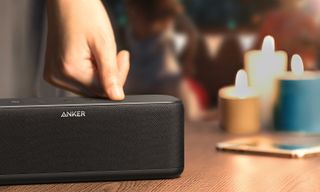
Anker — which started as a battery manufacturer — has made a name for itself in the budget Bluetooth speaker market by delivering good sound at a good value. With the $79 SoundCore Boost, it ventures out of the "cheap" category and tries to compete with brands better known for audio quality. The result is a speaker that offers excellent bass for the price, but not the overall fidelity of its more seasoned competitors.
Design
The SoundCore Boost is a fairly standard-looking black rectangle speaker. At 8 x 2.8 x 2.7 inches, it's less wide but thicker than the 8.8 x 3.5 x 1.8-inch $80 Fugoo Go, and larger than Anker's 6.5 x 2.1 x 1.77-inch $46 SoundCore 2.
It has buttons on the top for power, volume, play/pause and bass boost (which is labeled "Up"). If you press the play button twice, it skips to the next song; hold the play button for 15 seconds and it activates Siri or Google Assistant.
The SoundCore Boost delivers on the promise of big bass, but lacks the fidelity of slightly more expensive speakers.
Beneath a panel on the left side, you'll find a microUSB port for charging, a 3.5 mm auxiliary input and a USB port you can use to charge mobile devices.
Performance
The SoundCore Boost delivers on the promise of big bass, and the vocals are clear. But it lacks the fidelity that slightly more expensive speakers — such as the $90 JBL Flip 4 — can produce.
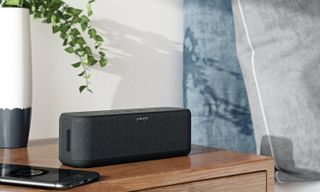
Anker's bass boost helped drive the thumping low end and distorted guitars on Nine Inch Nails' "Less Than" — something that the Fugoo Go had trouble reproducing. It also added resonance to vocals on songs like The War on Drugs' "Strangest Things." However, it couldn't match the Flip 4's crisp treble tones on that song.
The lack of treble was most noticeable on acoustic songs like Miles Davis' version of "Summertime," on which the horns sounded dull, and Big Star's "Thirteen," where the picking on the acoustic guitars lacked definition.
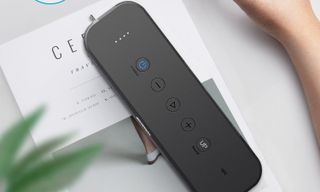
The Boost gets loud enough to fill a medium-size room. At max volume, I measured it at 90 decibels, though it sounded distorted at that level. The Fugoo Go achieved similar volume, though without distorting the sound.
Ruggedness
The SoundCore Boost comes with an IPX5 rating, meaning it can withstand water being sprayed at it, but not being dunked in the pool. I ran it under a faucet for a few seconds without any harm. Other models in this price range are more rugged: the Fugoo Go and Flip 4 can be completely submerged in water.
Battery
The Boost's 12-hour battery matches the Flip 4 and beats the Fugoo Go's 10 hours, but is underwhelming from a company that's known for batteries. The SoundCore 2, for example, features a 24-hour battery. In testing, the Boost lasted more than 10 hours and still showed a quarter left.
Speakerphone
Like many Bluetooth speakers in this price range, the Boost includes a speakerphone. People I spoke with said the microphone on the speaker was much quieter and harder to hear than the iPhone's built-in speakerphone. Thanks to the bass providing extra resonance, however, people who were talking to me were easier to hear.
Wireless and Setup
I connected without trouble via Bluetooth. The Boost also supports NFC for quick pairing with Android devices. It has a strong wireless signal, maintaining a connection at over 50 feet through several walls.
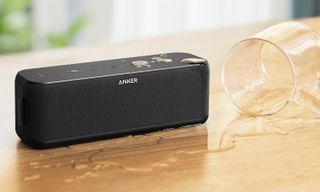
The only tweak you can make to the sound is the Bass Up button, which greatly increases the amount of bass. I found on some songs the bass was overwhelming with Up activated, so I toggled it on and off as needed. The speaker doesn't include an app to offer additional functions.
Bottom Line
At $79, Anker's SoundCore Boost occupies a middle ground between the masses of cheap Bluetooth speakers that cost less than $50 and the plethora of models that cost about $100. For the money, it delivers good sound and decent battery life. It produces an impressive amount of bass for a small speaker.
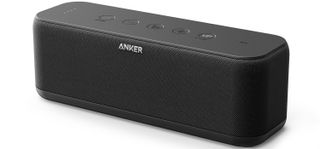
If you don't need a completely waterproof model, the Boost will meet most of your needs. But if you can spare an extra $10, the JBL Flip 4 offers better sound and more ruggedness.
Credit: Anker
Sign up to get the BEST of Tom’s Guide direct to your inbox.
Upgrade your life with a daily dose of the biggest tech news, lifestyle hacks and our curated analysis. Be the first to know about cutting-edge gadgets and the hottest deals.

Michael Gowan is a freelance technology journalist covering soundbars, TVs, and wireless speakers of all kinds of shapes and sizes for Tom’s Guide. He has written hundreds of product reviews, focusing on sound quality and value to help shoppers make informed buying decisions. Micheal has written about music and consumer technology for more than 25 years. His work has appeared in publications including CNN, Wired, Men’s Journal, PC World and Macworld. When Michael’s not reviewing speakers, he’s probably listening to one anyway.
